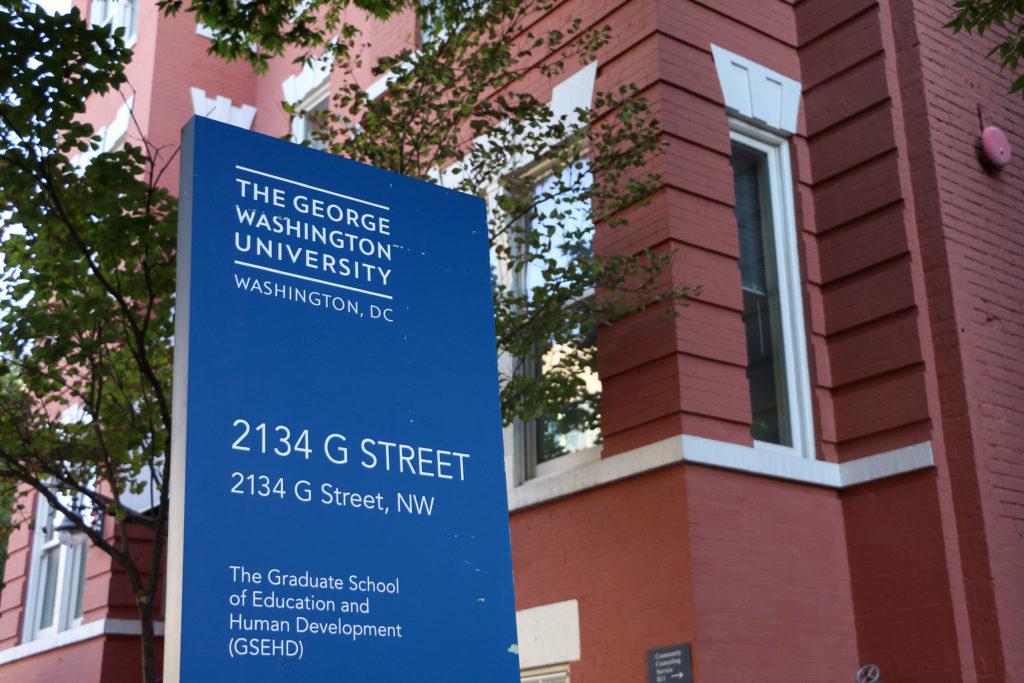
A Graduate School of Education and Human Development program partnered with DC Public Schools this fall to launch an equity-centered leadership cohort for teachers and administrators.
The first cohort of GSEHD’s Educational Leadership and Administration 18-month program began taking classes on equity in education — an initiative to aid underrepresented students and properly allocate school resources — to earn either a master’s or educational specialist degree by spring 2025. In June, GW faculty and DCPS administrators selected 16 DCPS staff, including current and aspiring principals and teachers training for administrative positions, to participate in the first cohort that will prepare them for leadership positions in the public schools.
The Wallace Foundation, a private organization that helps school districts across the United States fund projects to promote improved education, financed the cohort through a five-year grant to help build an “equity-centered pipeline.”
Rebecca Thessin, who leads the project as the principal investigator and an associate professor of educational administration, said GSEHD initially partnered with DCPS in spring 2020 on a research project investigating the best ways to teach aspiring DCPS leaders about equity in education so they can effectively communicate, support and build relationships with students and families. She said reworking parts of the curriculum to focus on the fair treatment of students in education led DCPS to submit a grant application to the Wallace Foundation for funding to create an equity-centered leadership grant.
“It began with a research project where we had a number of findings that then led to how we approached the work of redesigning our program to better support aspiring leaders’ development in DCPS,” Thessin said.
There were 49,890 students enrolled in DCPS in the 2020-21 academic year, with 58 percent Black students, 21 percent Hispanic and Latino students and 16 percent white students, according to data on the DCPS equity and strategic programming page. The page states that officials used this data to identify disparities, finding the existence of an “opportunity gap” between white students and students of color, that around 10 percent of DCPS teenage students are parents and 93.4 percent of DCPS students with disabilities were students of color in the 2019-20 academic year.
DCPS’ equity strategy and programming initiative uses this data to identify policies and resources centered around antiracism and inclusion, like preparing teachers for diversity, equity and inclusion lessons, providing resources for family and caregivers to support students at school and a guide for helping students with disabilities.
Thessin said training future principals and school leaders to build and maintain resource support for students with different needs and circumstances, like family responsibilities and disabilities, helps ensure “high-quality education” for all DCPS students.
“There’s very clear research showing the effect that a principal has on student learning and student outcomes,” Thessin said. “There is no doubt now that school leaders have the second-greatest impact behind the teacher, and the knowledge, skills and success that students will have in life based on their experience in school.”
Leslie Trimmer, the co-principal investigator of the program and an assistant professor of practice in educational administration, said the students in the cohort are also full-time DCPS employees, so courses are hybrid with both in person and online instruction. She said the majority of courses faculty offer are eight weeks long.
At the end of each class, there is an internship component designed for students to observe individual-level student support and apply strategies learned in class — like accounting for different students’ needs and backgrounds when allocating the school’s funds and resources, Trimmer said. She said students will also complete a 200-hourlong internship over the summer which will help them apply what they learned and bring new experiences to the classroom when they return.
“Every one of our classes has internship time designated that students will then take that theory and research and then go practice it and apply it right then in their school,” Trimmer said.
Kimberly Jamison, an assistant professor of educational leadership and administration, said she participated in the interview process for candidates who DCPS administrators selected for consideration in June. She said during the interview, candidates received “ongoing feedback” and the interviewers monitored the candidates reactions to assess their approach to criticism.
“We’re constantly learning, we’re constantly developing,” Jamison said. “So we were really looking for that growth mindset as well in the candidates.”
Jamison said she also helped develop coursework on the role of equity in school finance, focusing on academic and human resource budgeting and how to distribute resources to help students with different backgrounds, learning and support needs. She said GW and DCPS have the resources and faculty interest to provide equitable learning environments, and that these factors led to the collaboration.
“We’re fortunate to be in an area where we can recognize these issues, confront these issues and work with future leaders on how to address them,” Jamison said. “Not only recognizing where inequities exist structurally but also building the skills and knowledge to know what to do when they’re actually in those leadership positions.”
Jamison said faculty are going to “redesign” the online program and other in-person cohorts as well to apply the coursework they developed for this cohort. She said all education administrators need to know how to create and maintain equitable learning environments for students.
“We are interested in developing equity-focused leaders across the board, not just within DCPS,” Jamison said.